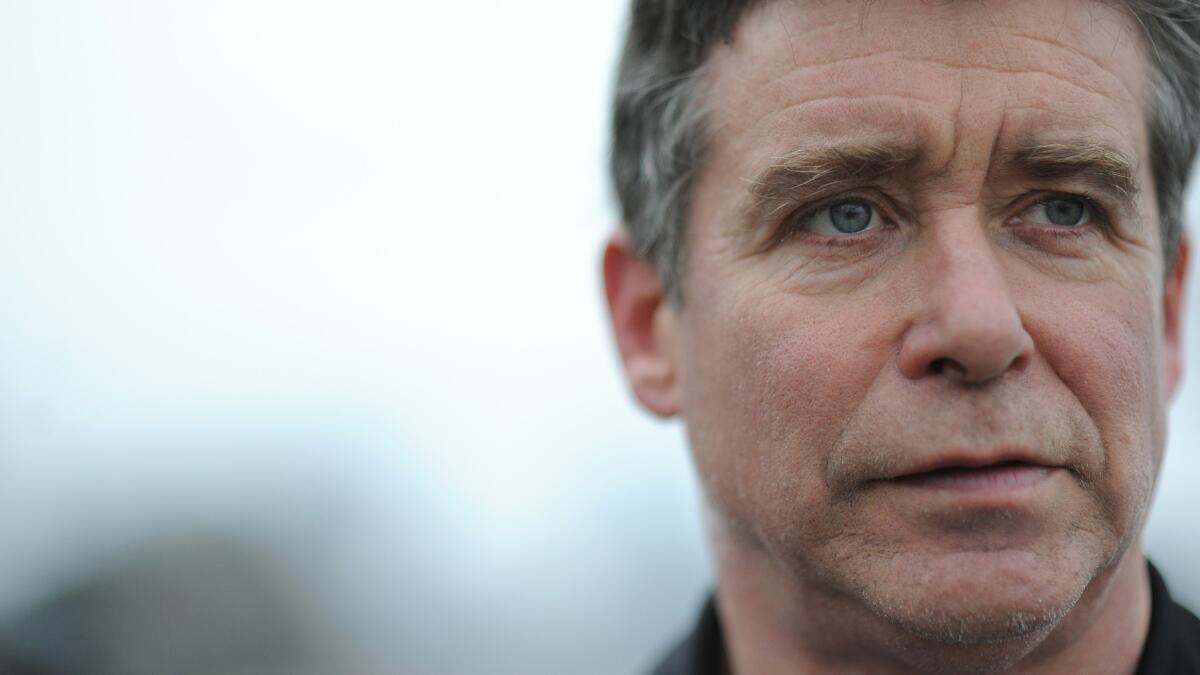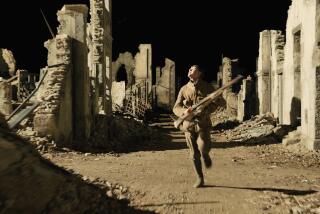Q&A: Jay McInerney on brightness, couples and catastrophe

- Share via
A moth to the flame, Jay McInerney is attracted to brightness. His new book, “Bright, Precious Days,” is his third to feature some form of the word. The first to do so was his debut novel, “Bright Lights, Big City,” which remains the quintessential documentation of the New York scene in the early ’80s. The second was “Brightness Falls” (1992), where we were first introduced to the characters Russell and Corrine Calloway. “Bright, Precious Days” is now the third novel (following 2006’s “The Good Life”) to feature this couple, following not just their marriage through the years but also the city as it changes, as it faces and inevitably overcomes catastrophe. In each book, the Calloways’ private lives are affected by public disasters -- the 1987 stock market crash, Sept. 11 and the 2008 recession.
Just as the novels oscillate between the bright and the dark, the private and the public, they also exhibit both romantic and satiric writing. McInerney admits being a disciple of both F. Scott Fitzgerald and Evelyn Waugh. That may seem an odd stylistic marriage, but, like the Calloways, you root for it to work out as you read — and by the end, it seems clear that it does.
McInerney comes to Los Angeles to discuss “Bright, Precious Days” on Mon., Sept. 26 at LiveTalksLA with former Times book critic David L. Ulin. We spoke with him by phone; the conversation has been edited.
What is it about the Calloways that keeps you coming back to them?
I guess I like them. They’re sort of an everyman and everywoman, but the sophisticated Manhattan version. Originally, I had this idea where I wanted to write a book with a billionaire and a homeless person because I had seen Ron Perelman and a homeless guy standing next to each other in the street back in 1989. I realized I needed someone in the middle to anchor this whole social panorama of New York. I had written a story about Russell and Corrine Calloway a few months prior, and I was intrigued by them: the “perfect couple,” the couple everyone looks up to, getting married early, throwing dinner parties. That was where they started. When I wrote “Brightness Falls,” I thought it was just a one-off. It took a while before I could imagine going back to them, but in many ways, “Brightness Falls” was my favorite of my books, and I continued to stay interested in these characters.
What is it about the concept of brightness that attracts you?
It’s a word that is multifaceted. I like all of its meanings, literal and metaphorical. I think all my characters in a way are moths attracted to the flame that is New York City.
There’s also darkness in these books. What is it about the dark historical moments that made you want to explore them through the Calloways and New York City?
I think relationships, cities, nations and races come into focus more clearly in times of crisis. There’s a Shakespeare quote in the book: “...when the sea was calm, all boats alike / show’d mastership in floating...” The basic idea is that anyone can float when the sea is calm, but what’s interesting is how a relationship or a city survives crisis. To be honest, it wasn’t a conscious decision on my part to focus on these catastrophes. When I started this book, I wasn’t thinking about the financial crisis. It’s almost a weird coincidence. September 11th is the most extreme example, with the middle book. In that case, I did set out trying to write a book about the crisis without having it overwhelm the story, but that wasn’t how this third book happened. The financial crisis just happened to be right where I was placing my book.
That Coriolanus line about “all boats alike” is mentioned in “Brightness Falls” too. It feels like it embodies the thematic underpinning of the whole trilogy. Was it always a touchstone for you in these books?
If I had a plan, it was unconscious. I had actually forgotten that I used that quote in “Brightness Falls.” The books are focused on marriage. I think that, dramatically speaking, writing about a happy marriage without any crisis is not very interesting. But I do think an interesting question is: What can a marriage survive? How much turmoil? How much revelation? What are the boundaries of forgiveness?
Some have called your writing romantic; others see it as satiric. How do you see yourself situated between those two?
I admit it’s a strange mix. It’s odd to me that some people get one and some get the other. They’re both there from the start in “Bright Lights, Big City.” Many people thought that book was purely satire, but it’s also a profoundly romantic story of a guy who lost his mother and wants to be a writer. I love both Waugh and Fitzgerald, and in a way, I’ve attempted a synthesis of those apparently antithetical modes. The Calloway novels seem big enough that they can include both.
In the novel’s final paragraph, you talk about the city as “an intimate landscape, a secret shared by two,” but you also admit that “the city is supremely indifferent to their transit through its arteries.” That ending captures these in-between states: brightness and darkness, romantic and satiric, private and public, intimate and expansive. Would you say this is a novel of those liminal states?
Yes, exactly. The bright and the dark, the romantic and the satiric, the private and the public, they’re all there, that in-betweenness. I’m trying to think about what I could say to improve upon your beautiful summary — probably not much.
Do you see this as a trilogy or will we see more of the Calloways?
Honestly, I thought this might be the concluding novel, but I’m still intrigued by these characters. There’s at least a 50% chance that I’ll return to them.
We’re in the midst of an election season that might provide the kind of crisis around which you could build a fourth Calloway novel. If Donald Trump gets elected, is that the fourth book?
I think that could constitute a crisis. I’m afraid Russell Calloway would have to finally make good on his threat to move to France, which he threatened to do in the last book. This election cycle is really almost a crisis unto itself: The fact that Trump is even a candidate and the fact that Hillary [Clinton] is running such a poor race. The almost fact-free nature of one candidate’s campaign is frightening. I fear we may be moving toward a post-factual world. Yeah, I’ve certainly thought of this as the start of a new book. As a writer, these are very interesting times. As a citizen, though, they’re very discouraging.
Malone is a writer and professor of English. He is the founder and editor-in-chief of the Scofield and a contributing editor for Literary Hub.
More to Read
Sign up for our Book Club newsletter
Get the latest news, events and more from the Los Angeles Times Book Club, and help us get L.A. reading and talking.
You may occasionally receive promotional content from the Los Angeles Times.






